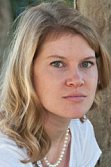Amy Field

Associated Ph. D. student
Supervisors: Prof. Dr. Sally Merry (New York University), Prof. Dr. Richard Rottenburg
Overview
Since the fall of the Berlin Wall there have been profound social and legal changes in reunified Germany. One such change is implementation of laws for farm animal protection. While West Germany had been subject to animal protection laws since the early nineteenth century, East Germany, under the Communist regime, had none. Reunification in the early 1990s exposed the stark differences in animal care practices on farms between eastern and western Germany. Since then, the states of former East Germany have been working to reform their farming practices and come into compliance with the state’s animal protection laws. Seeing this as a social and economic opportunity, farmers and agricultural regulators there represent and promote themselves as leaders in animal care and innovators in farm reform, attracting attention from across Europe. This study investigates how changing understandings of human-animal relationships find expression in eastern Germany’s radically transformed political, economic, and legal circumstances. Based on fourteen months of ethnographic research using methodologies including participant-observation, dispute analysis, narrative analysis, and life history interviews, this project has three primary goals: (1) to understand what kinds of political processes and which parties have created the pressure for farm reform in Germany, (2) to document and describe the ways in which participants in practices of animal care enact and struggle over new understandings of human-animal relationships, and (3) to track what kinds of disputes these new understandings produce and how they are negotiated and resolved to transform practices of animal care on farms.
My research objective is to investigate how the human-animal boundary is shifting, and how that shift is reflected in both the work and regulation of raising food animals. With this project, I hope to contribute to the theoretical corpus of anthropology by addressing the following questions: What influence will German and other animal and environmental protection laws around the world have on anthropological understandings of the relationships between humans, non-humans, and culture? How can we describe and conceptualize non-human animals as having generative effects on human beliefs, knowledge, and collective life? This project will analyze the specificity of German cultural frames for understanding animals in relation to binary theoretical models that treat the mechanisms for understanding non-humans as either Western or non-Western. By examining both the historical context of German animal protection law and its imposition in eastern Germany, this research traces the contours of the expanding animal protection regime. Ultimately, this study aims to develop a comparative social scientific framework for analyzing humans’ variegated understandings of their relationships with animals that goes beyond the simple Western/non-Western dualism.
| May 2012 - present | PhD Student at New York University Supervisor: Sally Merry Specializations: Legal Anthropology, Animals/Nature/Ontology, Narrative, Self and Personhood, Social Change, Europe Dissertation Project: Doing Good by the Animals: Law, Ethics, and Care in German Farm Reform |
| August 2010 - May 2012 | MA in Sociocultural Anthropology, New York University, New York, USA Supervisor: Sally Merry Master’s Thesis: Banning Schächten: Animal Protection Discourses and The Rejection of Religious Slaughter in Multiethnic Germany |
Native: English
Advanced: German
Intermediate: Swedish
Beginner: French and Spanish
| Fall 2013 | Teaching Assistant, Cultures of Spain, Prof. Thomas Abercrombie, New York University |
| Summer 2013 | Research Assistant for Prof. Sally Merry; English-language editorial assistance for Johanna Mugler and Sung-Joon Park, eds. A World of Indicators (2013) |
| November 23, 2013 (upcoming) | “Reading the Animal Body, Imagining the Animal Self: Legal Imaginaries of Farm Animal Health and Comfort in Germany.” Panel Title: Representing Animals: Nonhuman ‘Others’ in Human Publics. Annual Meeting of the American Anthropological Association, Chicago |
| April 12, 2013 | “From Alteration to Accommodation: Sentience, Property, and New Practices of Farm Animal Care in Eastern Germany.” Annual Meeting of the American Ethnological Society and the Association for Political and Legal Anthropology, Chicago. |
| February 2013 | New York University Graduate School of Arts & Sciences Dean’s Student Travel Grant |
| June 2012 | Annette B. Weiner Grant from New York University’s Department of Anthropology for Summer Research |





